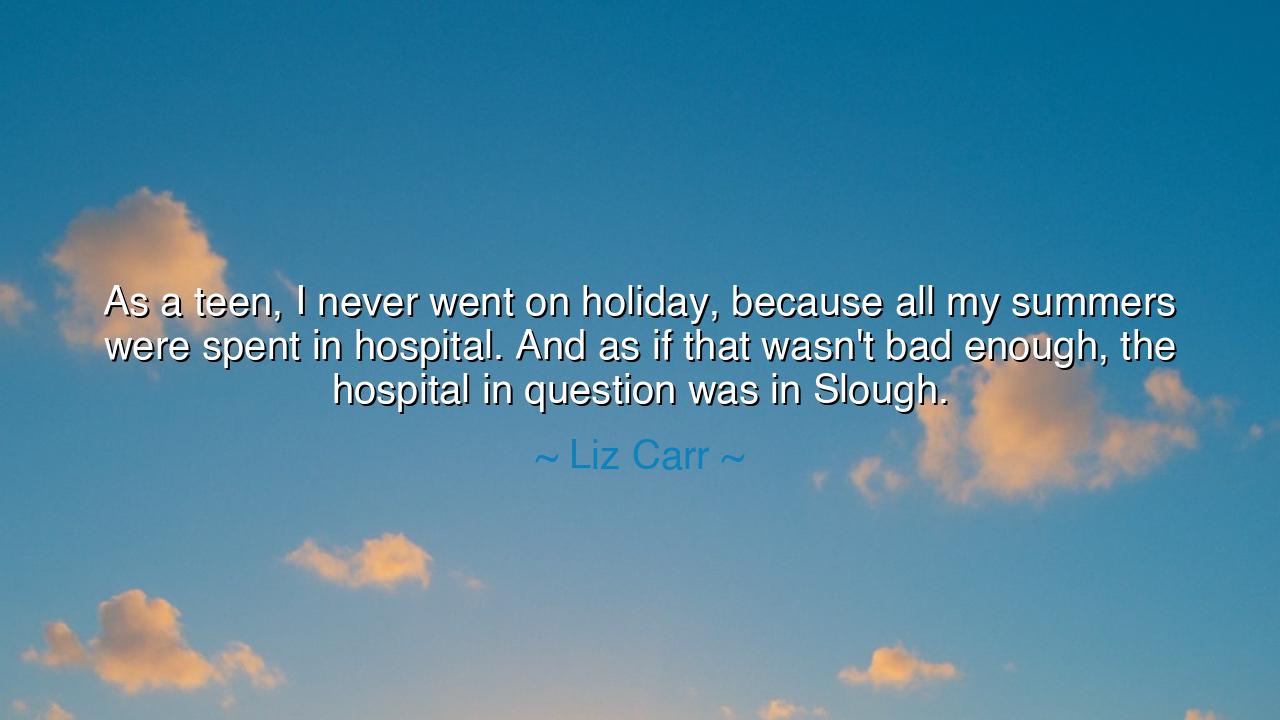
As a teen, I never went on holiday, because all my summers were
As a teen, I never went on holiday, because all my summers were spent in hospital. And as if that wasn't bad enough, the hospital in question was in Slough.






When Liz Carr, actress and advocate, once declared, “As a teen, I never went on holiday, because all my summers were spent in hospital. And as if that wasn't bad enough, the hospital in question was in Slough,” she spoke with humor sharpened by sorrow. Beneath the wit lies a truth both heavy and luminous: the hardship of youth constrained by illness, and the resilience of spirit that transforms suffering into laughter. Her words remind us that even in the darkest chambers of life—hospitals, corridors of pain and waiting—there remains the spark of irony, the weapon of the soul against despair.
The meaning of her words lies in the contrast between youth’s promise and youth’s burden. For many, summers are seasons of freedom—of sea air, holidays, and adventures beneath the sun. For Carr, those same summers were spent in hospital beds, under the harsh glow of sterile lights, hearing not the songs of the sea but the beeping of machines. And yet, she cloaks this painful truth with a jest, for even suffering can be endured when it is faced with laughter. Her humor becomes defiance, a shield against bitterness.
The reference to Slough carries this wit even further. Known in British culture as a town mocked for its dullness, it becomes a symbol here not merely of geography but of anticlimax—the final twist in her lament. It is as if she says: “Not only was I imprisoned by illness, but fate chose the most uninspiring of places for my captivity.” Through this jest, she teaches us that pain can be borne more easily when wrapped in irony, and that tragedy itself may be softened by comedy.
History offers us many mirrors of this spirit. Consider the story of Epictetus, the Stoic philosopher who was born a slave and crippled in youth. Though his body was broken, he wielded wisdom like a sword, declaring that while fate might bind his body, it could never bind his soul. Like Carr, he endured suffering not with bitterness, but with words that lifted others. Both reveal the same eternal truth: that human beings cannot always choose their trials, but they can always choose their response.
Carr’s words also reveal the power of perspective. To complain only of illness would have been expected, to speak only of hospitals, understandable. But she draws our gaze to something beyond: the ordinary, uninspiring town of Slough. In this, she teaches that often the details of life—the backdrop, the little ironies—can either crush us or become the very source of laughter. By choosing humor, she rises above both hospital and town, turning her suffering into a story that strengthens not only herself but those who hear it.
O seekers of wisdom, take this lesson into your own lives: when hardship comes, as surely it will, do not let it silence your laughter. For humor is not denial, but rebellion—a refusal to let sorrow define the spirit. Even when bound by illness, by limitation, or by the weight of place and circumstance, the soul remains free when it can still laugh.
Therefore, let Liz Carr’s words echo within you: “All my summers were spent in hospital… and in Slough.” They are more than complaint; they are testimony. They remind us that the human spirit is not broken by suffering alone, but by the loss of joy. Guard your joy, guard your humor, and carry them as shields. For though fate may send you hospitals and Sloughs, you may yet turn them into stories of triumph, told with a smile that no sorrow can erase.






AAdministratorAdministrator
Welcome, honored guests. Please leave a comment, we will respond soon